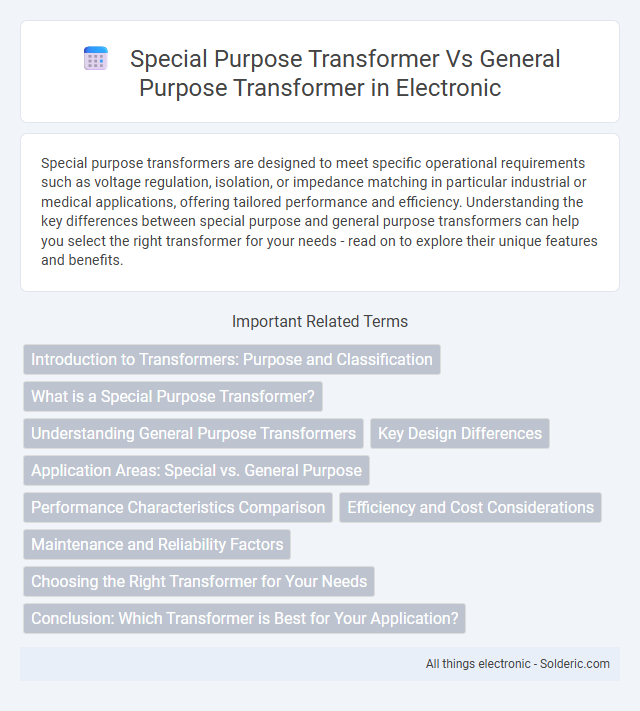Special purpose transformers are designed to meet specific operational requirements such as voltage regulation, isolation, or impedance matching in particular industrial or medical applications, offering tailored performance and efficiency. Understanding the key differences between special purpose and general purpose transformers can help you select the right transformer for your needs - read on to explore their unique features and benefits.
Comparison Table
| Aspect | Special Purpose Transformer | General Purpose Transformer |
|---|---|---|
| Function | Designed for specific applications (e.g., audio, medical, power conversion) | Used in a wide range of general applications, offering versatile functionality |
| Design | Optimized for targeted performance metrics, frequency, or load conditions | Balanced design to handle various loads and frequencies with moderate efficiency |
| Efficiency | Higher efficiency in intended specialized applications | Moderate efficiency across diverse use cases |
| Cost | Higher cost due to customization and specialized materials | Lower cost due to mass production and standard components |
| Applications | Medical devices, audio equipment, power electronics, instrumentation | Industrial supply, power distribution, general electronics |
| Flexibility | Limited flexibility; tailored for narrow operational scope | High flexibility; suitable for multiple usages and variations |
Introduction to Transformers: Purpose and Classification
Transformers are electrical devices designed to transfer electrical energy between circuits through electromagnetic induction, classified into special purpose and general purpose types based on their applications and design features. General purpose transformers are widely used for standard voltage step-up or step-down functions in power distribution with versatile adaptability. Special purpose transformers are engineered for specific industrial tasks, such as isolation, instrumentation, or high-frequency operations, offering optimized performance for targeted electrical requirements.
What is a Special Purpose Transformer?
A Special Purpose Transformer is designed to meet specific electrical requirements and applications, such as isolation, voltage regulation, or impedance matching, which general purpose transformers cannot efficiently address. These transformers often feature customized windings, insulation, and core materials tailored for unique operational conditions in industries like medical equipment, audio systems, or high-frequency circuits. Understanding the particular function of your equipment helps determine when a Special Purpose Transformer is essential for optimal performance and safety.
Understanding General Purpose Transformers
General purpose transformers are designed to handle a wide range of voltage and current requirements with stable performance across various applications, including power distribution and electronic devices. These transformers typically feature standardized cores and windings suitable for general electrical isolation, voltage conversion, and impedance matching. Their versatility makes them ideal for use in residential, commercial, and industrial settings where specific customization is not critical.
Key Design Differences
Special purpose transformers are engineered with customized core materials, winding configurations, and insulation systems to meet specific application requirements such as high-frequency operation, voltage regulation, or isolation. General purpose transformers feature standardized designs optimized for broad use, emphasizing durability and compatibility with typical voltage and load conditions. Your choice depends on whether specialized performance criteria or versatile functionality is paramount for your application.
Application Areas: Special vs. General Purpose
Special purpose transformers are designed for specific applications such as medical equipment, welding machines, or shipboard power systems, where precise voltage regulation, compact size, and tailored performance characteristics are critical. General purpose transformers serve a broad range of applications including residential power distribution, industrial machinery, and commercial buildings, offering standardized voltage conversion with robust and versatile performance. The specialized engineering of special purpose transformers provides enhanced efficiency and safety for niche uses, while general purpose transformers prioritize adaptability and cost-effectiveness across diverse electrical systems.
Performance Characteristics Comparison
Special purpose transformers are engineered for specific applications, offering higher efficiency, precise voltage regulation, and tailored insulation suitable for unique operating conditions, unlike general purpose transformers that provide broad, versatile performance across standard applications. You can expect special purpose transformers to exhibit superior thermal management and reduced losses, enhancing reliability in demanding environments. General purpose transformers prioritize cost-effectiveness and adaptability but may sacrifice optimal performance details critical for specialized industrial or medical equipment.
Efficiency and Cost Considerations
Special purpose transformers are designed for specific applications, resulting in higher efficiency by minimizing losses tailored to unique load conditions, whereas general purpose transformers offer moderate efficiency suitable for a wide range of uses. The manufacturing cost of special purpose transformers is typically higher due to customized materials and engineering, while general purpose transformers benefit from mass production economies, reducing overall expenses. Evaluating efficiency gains against increased costs is essential when selecting between special purpose and general purpose transformers for optimized performance and budget management.
Maintenance and Reliability Factors
Special purpose transformers require tailored maintenance protocols due to their customized design and specific application demands, often involving unique components that necessitate specialized expertise. General purpose transformers benefit from standardized manufacturing and widely available parts, enabling simpler maintenance routines and generally higher reliability in typical operating conditions. Reliability factors for special purpose transformers emphasize performance under specialized loads and environmental conditions, while general purpose transformers prioritize versatility and consistent function across diverse applications.
Choosing the Right Transformer for Your Needs
Selecting the right transformer depends on the specific application requirements; special purpose transformers are designed for unique functions such as voltage regulation, isolation, or specific industry needs, ensuring optimal performance and efficiency. General purpose transformers provide versatility for standard voltage conversion tasks in residential, commercial, or light industrial contexts, offering cost-effectiveness and broad compatibility. Evaluating load characteristics, environment, and electrical specifications ensures proper transformer selection to enhance operational reliability and safety.
Conclusion: Which Transformer is Best for Your Application?
Special purpose transformers offer tailored features such as enhanced insulation, customized voltage ratings, and specific environmental protections, making them ideal for applications requiring precise performance and reliability. General purpose transformers provide versatility and cost-effectiveness suitable for standard voltage conversion and common electrical needs. Your choice depends on the application's complexity and specificity, with special purpose transformers best for critical or unique requirements and general purpose transformers well-suited for routine electrical tasks.
special purpose transformer vs general purpose transformer Infographic

 solderic.com
solderic.com